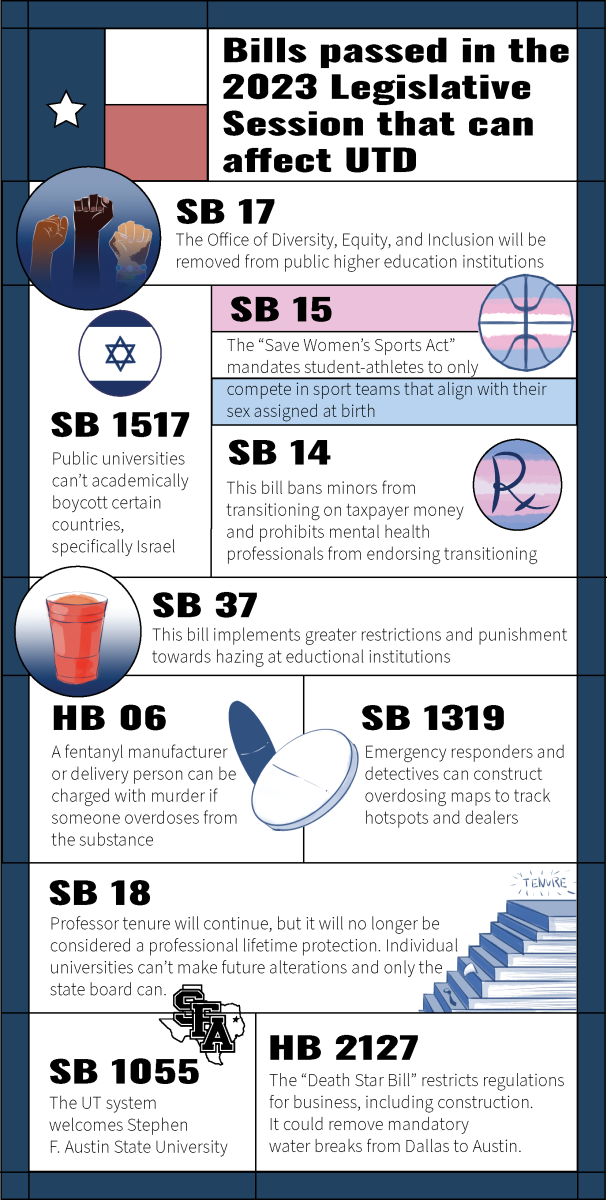The Texas legislative season ended on May 29, with Governor Greg Abbott signing several higher education bills into law that could impact UTD’s future.
Amongst the hundreds of bills approved this session include a ban on programs of Diversity, Equity and Inclusion, tenure protection policies, UTSystem changes, bills affecting the transgender community, increased fentanyl penalties, stricter anti-hazing laws and construction interference.
Diversity, Equity and Inclusion offices are to be dismantled from campuses by January 2024 under Senate Bill 17. It’s unknown how exactly the law will affect various departments within the campus.Brooke Everette, assistant vice president of student affairs, said UTD will still do its best to ensure an equitable education and campus.
“We at the University of Texas at Dallas are administrators … [that] are committed to still ensuring a safe campus. A campus that is welcoming for all faculty, staff and students,” Everette said. “Here in the division of Student Affairs, our tagline is that you belong here and we are not looking to change that anytime soon. So, we are still committed to that. It’s just a matter of how we can continue to live that out within this new legislation.”
Professor tenure will continue in Texas, but Senate Bill 18 revokes the power for individual university system boards to make tenure policy changes in favor of the state board dictating future alterations and definitions, effectively giving them power to intervene in decisions of continued employment. The lawwill be enforced Sept. 1. The law replaces rigorous individual guidelines for what critics are describing as universally vague and potentially dangerous, however, UTD already practices a majority of these procedures. Stephen Spiro, associate provost of auxiliary services, expresses how the uncertainty of the current political climate could have been worse.
“The extent at which this impacts our future hirings, I think remains to be seen,” Spiro said. “I feel reasonably confident actually that the impact will not be so severe because I think we can reassure applicants for our position that the law really is just codifying things we were already doing.”
Titled the “Save Women’s Sports Act,” Senate Bill 15 will require student athletes to compete in intercollegiate sports teams that align with their sex assigned at birth. The NCAA already has policies permitting women can only compete if they are below a certain testosterone level, however, this puts into effect that student athletes cannot compete generally or in the ASC going forward unless they are on their assigned team. UTD does not currently have any transgender student athletes, however, any future student athletes will be banned from being able to compete on a team they identify with. The bill also dictates that public universities violating this law will be heavily fined.
These bills have generated controversy and may potentially impact faculty recruitment. Spiro suggests that, according to anecdotal data, such concerns have been consistently related whether hires join UTD for the last two to three years. While it’s too early to say what impact this year’s legislation will have, it does narrow the pool of applicants interested in joining UTD if certain policies are or aren’t supported by law.
“There are concerns about other things that are part of the political landscape.” Spiro said. “In addition to tenure, reproductive rights, of course, is one of them — and I know that has had impacts on faculty recruitment. Healthcare in general, gun safety, and I think the other one that’s now on the books and is significant to UT Dallas is SB 17.”
Taking effect Sept. 1, public drag shows will be banned from being presented to individuals below the age of 18 according to Senate Bill 12. This means anyone who hosts a drag show where minors are presents could be fined $10,000 and charged with a criminal offense. Meanwhile, the Texas Legislature also passed a bill specifically for UT Systems. Senate Bill 1055 states Stephen F. Austin State College will be admitted into the UT System, which could see system program collaborations in educational, health care and research needs.
Texas also passed Senate Bill 1517 which prohibits public universities from academically boycotting Israel and may allow students to study abroad if institutionally approved.
There are also several bills indirectly impacting UTD. In response to a growing fentanyl crisis among adolescents and young adults in the DFW metroplex, Governor Abbott has signed House Bill 6 into law declaring that fentanyl dealers tied with overdoses will receive the equivalent of a murder charge in court, effective Sept. 1, 2023. It’s estimated that fentanyl is a factor in 53% of overdoes according to the National Center for Drug Abuse Statistics, making it one of the most dangerous opioids in the world. The latest DFW task force news including a Fort Worth bust recovering 900,000 doses of fentanyl. With concerns that fentanyl is reaching public institutions, the law hopes to cease the growing death count, with Senate Bill 1319 allowing emergency response and detectives to construct overdose maps to start tracking dealers and hotspot locations.
This is accompanied by Senate Bill 37 which will continue to enforce and develop greater restrictions and consequences towards college hazing.
While UTD is not known for its hazing or fentanyl, it is known for its constant construction and development, as humorously portrayed with Enarc. House Bill 2127, otherwise called the “Death Star Bill,” strips local city authority in favor for statewide regulations for business, including construction efforts. Effective Sept. 1, 2023, it could remove mandatory water breaks from Dallas and Austin, which is being described as a death sentence for construction workers amongst excessive heatwaves.
The Mercury will continue to monitor the development of ODEI’s removal from campus and other bills of interest to the students and faculty.





